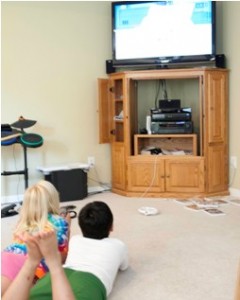Supreme Court Ruling on California Video Game Law Could Hurt Children
by Teresa Tomeo | August 13, 2011 12:03 am

Photography by Paul Johnson
I don’t get it. We have restrictions on the sale of tobacco and alcohol to minors. But we can’t hold video game retailers accountable for selling adult games to unaccompanied minor children? The answer to that question is “yes” according to a decision handed down last month by the U.S. Supreme Court. In its decision the justices pointed to the importance of the First Amendment claiming that video games, even the most violent, are to be treated like any other “artistic” medium. But this wasn’t about interfering with free speech or artistic endeavors and creativity. Nor did the law prevent the games from being produced or marketed. The California measure only dealt with the sale of violent games to children under the age of 18.
Why do we have these other restrictions? Because we are trying to keep our children safe and healthy, that’s why. Unless you have been asleep or sequestered the last few decades you’re probably well aware of the vast amounts of research, for example, that has been done not only about the dangers of tobacco use and cigarette smoking. Surveys show that show kids who start smoking at younger ages are more likely to jump to abusing other types of dangerous substances. According to the National Center for Addiction and Substance Abuse, CASA, nicotine “significantly affects the structure and chemical changes in the developing brains of adolescents and could make teens more vulnerable to alcohol and drug addiction.” So it doesn’t take a rocket scientist to see why sales restrictions are necessary. Smoking is bad for you and the earlier you start lighting up, the more problems you could run into health wise in the future. Parents TV Council President Tim Winter said the ruling will give the video game industry “no fear of any consequence for violating the video game industry’s own age restriction guidelines.” In other words; parents beware. There is more than enough evidence to show the fall out from violent video games and now it’s free for all for the video game industry.
“Countless independent studies confirm what most parents instinctively know to be true; repeated exposure to violent video games has a harmful and long-term effect on children. Despite these troubling findings, video game manufacturers have fought tooth and nail for the “right” to line their pockets at the expense of America’s children,” Winter said in a June statement.
The ruling is disappointing and in many ways goes against government efforts that have been under way for years to crack down on the sale of violent games, namely first-person shooter games. Archbishop Charles J. Chaput of Denver, Colorado issued a strong and insightful commentary on this in a July 1st column for First Things magazine. Because of the popularity of violent games among those accused in a number of high school shootings including Columbine, the Federal Trade Commission more than ten years ago began conducting its own “Secret Shopper” campaigns which regularly demonstrate a high failure rate for retailers. The Archbishop explains how he spent the days after the April 20, 1999 massacre with his brother priests burying the dead and visiting families of the Columbine victims. A few weeks after the shooting he spoke to a special session of the U.S Senate Committee on Commerce, Science, and Transportation. The Committee was focusing on marketing violence to children. The Archbishop, along with the Parents Television Council, disagrees with the Supreme Court ruling.
“My point here is not that video games are bad. My point is that when we too readily stretch an individual’s right to free speech to include a corporation’s right to sell violence to minors, we collude in poisoning our own future and tragedies like Columbine are the indirect but brutally real proof of what I mean.”
So where does that leave Mom, Dad, and junior? This latest ruling is all the more reason to take a much closer look at what types of media products your children are using. Visit the web site of the Entertainment Software Rating Board at www.esrb.org[1] , along with the PTC at www.parentstv.org[2] for the latest reviews, ratings, and information on gaming. As for advice from the PTC, the organization is calling on the Entertainment Merchants Association to redouble its efforts for increased sales enforcement. They’re not, however, exactly optimistic. Instead they’re also issuing another reminder that just as with alcohol and cigarette regulations, it’s helpful to have laws to help protect our families. In the end the buck really does start and stop in the home.
Please help us in our mission to assist readers to integrate their Catholic faith, family and work. Share this article with your family and friends via email and social media. We value your comments and encourage you to leave your thoughts below. Thank you! – The Editors
- www.esrb.org: http://www.esrb.org/
- www.parentstv.org: http://www.parentstv.org/
Source URL: https://integratedcatholiclife.org/2011/08/supreme-court-ruling-on-california-video-game-law-could-hurt-children/